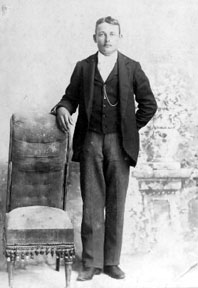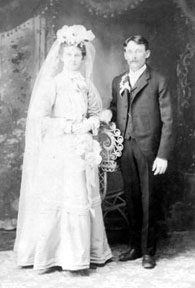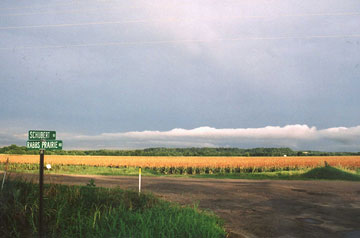Text of historical marker at US Hwy 77 and Rabb's Prairie Road erected in 1996:
Rabb's Prairie
This portion of Fayette County is named for William Rabb (1770-1831), a prosperous miller from Pennsylvania who came to Texas in 1821 with members of his family. Rabb claimed a site on the east side of the Colorado River he had selected during an exploratory trip in 1819. He was a member of Stephen F. Austin's first colony in Texas, and recipient of one the earliest and largest land grants of more than 22,000 acres, of which 13,285 acres comprised Rabb's Prairie. Part of Rabb's agreement with Austin was to build a grist mill for future settlers of the colony.
Two grinding stones for the mill weighing about one ton each were imported from Scotland and unloaded at the mouth of the Colorado River on the Gulf of Mexico. In order to transport the heavy stones to the site of the grist mill, Rabb constructed a wooden axle and attached a round stone on both ends to serve as wheels. He then hitched oxen to the vehicle and pulled it about 100 miles in 1831; Rabb died shortly afterward. Through the years his descendants played significant roles in the development of Texas. The community of Rabb's Prairie was named for this pioneer family.
Photo contributed by Marion and Steve Daughtry
A Footprints of Fayette article submitted by Carolyn Heinsohn:
Rabbs Prairie Floods in the '30s
by Evelyn Rainosek Vecera
submitted by Carolyn HeinsohnThe following recollections were written over 30 years ago by Evelyn Rainosek Vecera of Bellaire, Texas. The daughter of Anton and Elizabeth Svrcek Rainosek, she grew up at Rabbs Prairie north of La Grange. The flat, rather low farm land was prone to flooding before the dams were built on the Colorado River above Austin.
Life was very peaceful and beautiful by the Colorado River, the place of my birth on December 4, 1927 on the farm of my grandparents, John and Frances Stolar Svrcek. My parents, Anton and Elizabeth Svrcek Rainosek, were living there and farming cotton and corn, and Mother always had a large vegetable garden.
My earliest recollection of life was at the age of 3 ½ years when my brother, Daniel, was born. I was the babysitter while Mother picked cotton close to the house and did other chores. Then I have recollections of other events like when I started 1st grade at Rabbs Prairie School, etc.
The year 1935 is my beginning memory of the floods. They continued it seems to me every year till the last one that I recall so well in 1938. We had no conveniences – electricity, running water, radio or phones, but our close neighbors, Mr. and Mrs. Willie Witt, Sr. had a phone, and they would keep us posted along with my grandparents as to when or how high the water could come.
When we got the word that we would be flooded, everything had to be moved. All the furniture went upstairs, except the iron cooking stove. Cattle, hogs, chickens, etc. all had to be moved to high ground. It was an enormous job, and the people left last. I recall usually staying in La Grange with my aunt and uncle, Mr. and Mrs. Clyde Robertson. We waited for the water to recede and when it did, we went back home to find what – the smell of mud and rotting crops and polluted drinking water. I remember the job of taking brooms and water and washing the mud out of the house – floors had buckled as they were wooden.
Since the floods always always came in the spring, the crops were beautiful at the time, so for several years very little was made to sell. On top of this, the only aid any of the farmers received was the terrible antiseptic or whatever was put into the wells, and then we could not drink the water – it had such an awful taste. There was no money to buy soda pop, etc.
In the year 1938, starting about the month of April, May or June, my father became ill. He had fallen a short time before, and he was in a great deal of pain with his back. At that time, we were warned of another flood on its way. We were waiting as it was not definite that Rabbs Prairie would be flooded, so I don’t recall the day, but the water had come up to within maybe 10 or 15 feet of our front porch. We had a tree near the house, and we had our boat tied to the tree.
My father was so upset with his illness, he did not want to leave the house, and we did not put our furniture upstairs – maybe we had started, but were not finished. My mother, Dad, Daniel and I went to sleep as usual and with God’s grace, by morning the water had receded. Had the flood escalated during the night, I am sure I would not have been here to write about it. Since the water did not completely kill the crop, the cotton just grew very tall, but did not make much of a crop.
That year is very painful for me to remember as Dad got worse and was in and out of the hospital and ended up there for three months with an operation that was to have been for gall stones, but cancer had spread all over his body, and so on November 11, 1938, Dad died at age 38. During those summer months, when mother was at the hospital so much of the time, Daniel and I tended to the feeding of the farm animals and picking cotton, etc. At night, we would go to my grandparents or my Uncle August Svrcek.
A letter written in 1982 by Mrs. Vecera to the Fayette County Record regarding a request for photos of the floods stated: “We do not have any pictures, because we were too poor to even own a camera, but one thing I can tell you that might be of interest – we lived on my grandparents’ farm (John and Frances Svrcek) and that house still stands. In the house, Grandfather had marked a place with how high the water was in the 1900s, including 1935.”
 |
 |
Wilhelm Bernhard (Ben) SchoppaBorn at Warda, Ben was the son of Maria Zoch and Michael Schoppa. |
Augusta Kraatz (1886 - 1982) and
|
Submitted by Tony Zoch Hettler
Contact Rox Ann Johnson if you have old photographs you would like to contribute.
 Related Links
Related Links
